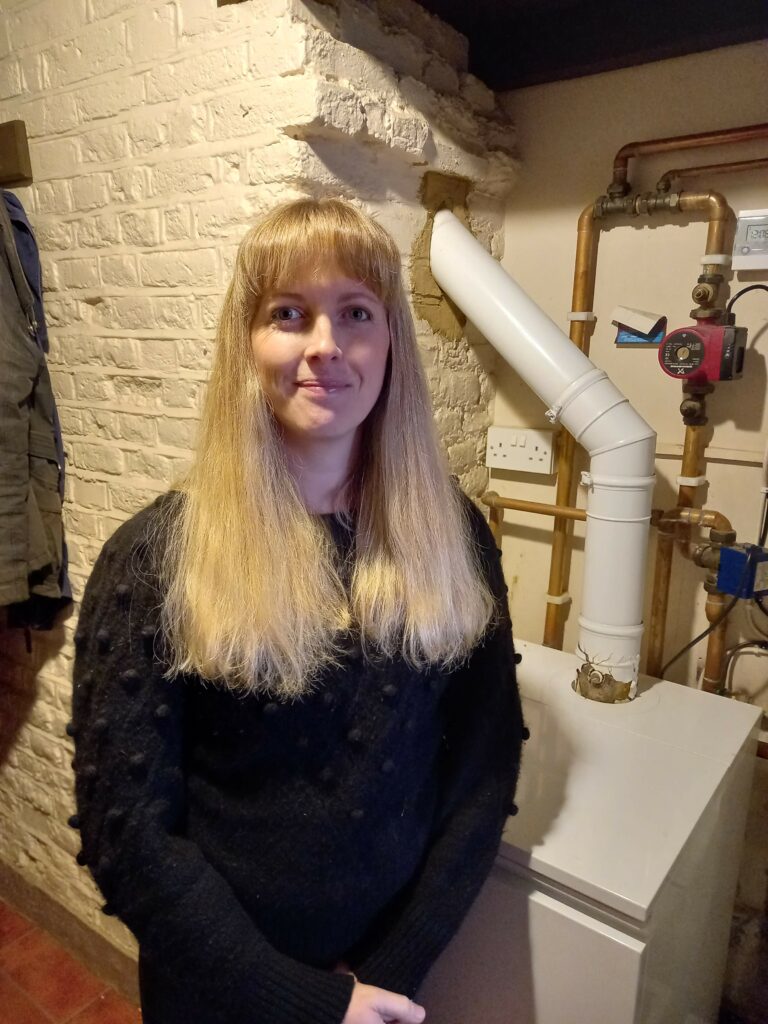Julia Kirby-Smith, from Blean in Kent, wants the option to switch from oil heating to renewable liquid fuel to play her part in cutting carbon emissions
In response to growing pressure from rural homeowners and backbench MPs, the Prime Minister recently announced the proposed ban on the installation of new oil boilers in 2026 would be pushed back until 2035.
The move was welcomed by rural communities, but not because people are against the principle of cutting carbon emissions. The concern was over the fairness of the policy and the significant costs homeowners could face in an early transition to heat pumps.
But that doesn’t mean we have to stick to the status quo for the next ten years. If oil households want to play their part in cutting carbon emissions and alternative, more feasible, solutions are available, why would we want to hold them back?
An oil household stuck in limbo
Julia Kirby-Smith lives in Blean, a village in the Canterbury district of Kent, with her husband and two children. They moved out of London and into their traditional farmhouse home around a year ago.
The property is not connected to the gas grid and is one of the 1.7 million homes in the UK which relies on oil heating. Like many older rural properties, the building has low energy efficiency. The oldest part of the home dates back to 1730 and has single glazed windows and only basic loft insultation.
Keen to play her part, Julia researched whether she could install an air source or ground source heat pump to cut her carbon emissions. She was told that the recommended ‘fabric first’ approach (improving insulation and windows first) could make a heat pump suitable for certain parts of the house, but it would still be difficult to implement in some rooms.
She also found the cost to make the necessary building upgrades before installing a heat pump was tens of thousands of pounds, and the invasive work needed could impact the historic nature of the building.
The property will therefore remain on oil heating. The existing oil boiler was installed in 2020 and has a new bunded oil tank. This means, under the government’s current proposals, Julia could continue to use oil for the full lifecycle of her heating system which could be around 20 years. This would be well into the 2040s.
But Julia is concerned about climate change and wants to reduce her carbon emissions today. However, without a viable solution in heat pumps, her and her family are stuck in limbo. Her situation is typical of many other oil homes and is the perfect demonstration of why renewable liquid fuels such as Hydrotreated Vegetable Oil (HVO) are so important.
The fuel works in existing oil heating systems following a minor modification to the boiler which is expected to cost around £500 and can be completed as part of a routine service. The fossil free fuel reduces emissions by a staggering 88%. Around 150 properties have successfully made the switch as part of an industry demonstration project.
Julia believes fuels like HVO are the ideal solution for her situation and would mean she can start making a difference today. She is certainly not alone in this. A recent survey of oil households found over 97% wanted the option of switching to a renewable liquid fuel as an alternative to heat pumps.
“HVO seems like the most sensible option for us”, says Julia. “It avoids us having to rip out a perfectly good oil heating system and install a heat pump which would be costly, disruptive and generate unnecessary waste which isn’t good for the environment.
“I’m passionate about the fight against climate change and with HVO I could make an immediate impact. A heat pump simply isn’t feasible in my situation so it doesn’t make sense to ignore a perfectly ideal alternative in HVO.
“I don’t like the idea of waiting around and doing nothing. We need to do everything we can, so if we can take steps to cut our emissions now we should be doing so. HVO is currently more expensive than kerosene so it’s not a simple decision, but I’d like to switch. Whether I use HVO as a short term solution – until I can afford to install heat pump technology that will be suitable for my house – or continue to use it indefinitely, I’d like to have the choice.
“It would be good to see the government actively encouraging older rural properties to move to HVO right now, supporting it with the subsidies enjoyed by the haulage industry. I feel older properties in rural villages like mine are often misunderstood. Heat pumps are far from a quick fix. That’s why there is a lot of excitement about HVO.
“If the government plays it part in supporting the fuel, I think this will be very popular in rural communities.”



